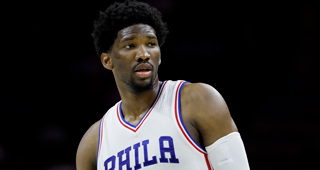Joel Embiid is waving. The crowd at Wells Fargo Center in Philadelphia is roaring on a Friday night, in the twilight of a triple-overtime thriller against the Oklahoma City Thunder. In the effort to defend Embiid, the most dexterous seven-foot post player the NBA has seen since Shaquille O’Neal, Thunder big man Steven Adams has fouled out. Embiid is smiling while waving goodbye to Adams, but he is doing it while facing the crowd and, probably more importantly, in clear view of the cameras. Rarely has a player ever exercised his understanding of how often he is being watched and shared as much as Embiid does.
This wave, like a million micro-movements he performs throughout the game—and this game is on ESPN, and everyone is tweeting about it—has Embiid flashing his unusually ironic self-awareness of celebrity in professional basketball. At 23 and as a Cameroonian immigrant to America since the age of 16, Embiid is showing a fresh generation of superstars a new way to be—and it has more to do with putting on tongue-in-cheek, one-frame gestures the likes of which you’d see in a sitcom theme song than it has to do with over-trodden sports clichés. This is never more apparent than against the Thunder, when Embiid’s goofy asides stand in contrast to Russell Westbrook’s typically effervescent snarling routine between plays, a naked display of his sporting alphaism.
That Embiid is, within his narrative of himself, the very best: this seems peripheral to the story he is telling us, almost a non-consideration. That he has risen from a country where nearly half the population lives below the poverty line seems a sidelined element of his chronicle, too. It comes up when he’s pushed on it, like when it’s suggested to him by reporters that his on-court trolling might result in someone wanting to fight him. “I’m 7’2” and I’m a big dude, so I don’t think you want to try me. And I’m African too,” Embiid said when pressed to this line on Sportscenter. In addition to irking Adams and Westbrook in the heated contest against the Thunder, Embiid also drew the ire of Carmelo Anthony after a tense post-up possession that ended with words exchanged face to face.
There’s little precedent for the sort of disruption Embiid is bringing to the league’s celebrity constellations. Seldom has an up-and-comer been so flippant about league etiquette, so rude in his arrival. A student of both the game and the fame that comes with it, Embiid is not interested in prolonging traditions of generational deference, but breaking them. His is a punk-rock ascendancy, bored with the confines that his forebears have set for him. For fans of his 76ers and of the league in general, the performance of this mindset produces a drug-like sense of liberation. Embiid feels more free than the legends he’s meant to emulate.
Embiid’s focus on both unbeatable basketball skill and the ability to spiritually assassinate his opponents with mythos and insults has one true contemporary parallel: Draymond Green. Green has never had quite the proclivity to take over a contest with isolation scoring that Embiid has already shown (best exemplified by his 46-point performance in a win over the Lakers in November), but Green does everything else at an All-NBA level, and his competitive streak is more full and human than most can handle. The man who reduced Paul Pierce to a deserted prom date with his words, last season, sees a likeness in Embiid. After trash-talking each other relentlessly throughout a game in November, Green said “I love that dude” of Embiid, later tweeting that he looks forward to playing against him for years to come.
The beating heart of basketball’s best team of the century, Green has established a strategic and emotional blueprint for how to put the rest of the league on watch, and Embiid looks poised to eclipse it. In a recent interview with ESPN’s Ramona Shelburne, Embiid revealed the depth to which he’s studied not just how to play basketball, but also how to manage the spectacle of personality that comes with playing it as well as he does, on such a high stage. "People love you at the beginning," Embiid told Shelburne. "But at some point they're gonna start hating you. LeBron. Russell Westbrook. All the superstars. Even Steph. He's so likable. He does nothing wrong, but some people still hate him. It just comes with the nature of it. I've seen it… I feel like I'm about to go through it. I think it's coming. People always want something new.”
Embiid looks into his future and sees both the range of what he’ll need to do as a player and what he’ll need to do as a human—the amount of masks people will expect him to wear, the trials they’ll want to put his personality through. By being so studious and so many steps ahead, putting on airs that no one expected, he is so far putting us, and the NBA, through these trials instead. He is making us ask questions about how our idols are supposed to behave. He sees set pieces before his peers do, and before the audience does either. He makes everyone react to his strange mix of intimidation and levity before he has to react to anything himself. The well-known aspirational, rags-to-riches stories of internationally famous athletes and their excellence are are within him, but they are shelves beneath what Embiid is showing us as he entertains us in new ways.



